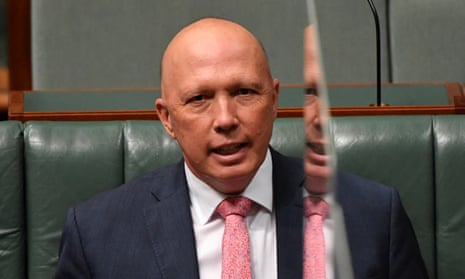You’ve got to wonder how Peter Dutton, one of the most wealthy and overstretched members of federal parliament, fathoms up the wherewithal to sue for defamation an unemployed, crowdfunded refugee advocate who called him something nasty on Twitter.
Busy? You bet you are. It’s been quite the few weeks for the tough-talking but “soft” (see below) sunshine state ex-copper made very good.
What with ripping up the US-Australia alliance rulebook on strategic ambiguity on Beijing and Taipei and apparently talking up the possibility of a war with China into which us down under would necessarily follow Washington, all the while upwardly flacking suggestions the prime minister is fast becoming the Lyin’ King of our political savanna amid speculation he’s also preparing to challenge, it’s an exciting time to be this particular defence minister.
But not too exciting so as to not see through the defo case against Shane Bazzi who called Dutton a “rape apologist” in a tweet that linked to a 2019 Guardian Australia article which reported comments by the minister that some refugees were “trying it on” with claims they’d been raped and must travel to mainland Australia from offshore detention for abortions.
Bazzi’s now-deleted tweet was also posted the same day Dutton said he was unaware of the “she said, he said” details of Brittany Higgins’ rape allegations.
The ins and outs of the federal court trial, which found in Dutton’s favour with a relatively small damages ruling of $35,000 (small, that is, compared to other defamation payouts but huge when imposed on an unemployed activist) have received maximum coverage. And, so, here we are ... talking about it again.
Which begs a few questions, not least: is it better for politicians to suck up the inevitable barbs of social media or to pursue some pyrrhic vindication by pouring legal petrol onto the already ignited emotional/reputational bonfire?
(Bazzi, due to the comparatively paltry size of the payout, can now seek reduced costs.)
Justice Richard White pointed out that Bazzi’s tweet did not have a wide readership and that he had the impression that while the minister experienced “initial affront”, he had not experienced “continuing distress”.
“There is no suggestion that the tweet has affected Mr Dutton in his day-to-day political or ministerial activities, or in his relationships with other people,” said White who, in October, had urged both parties to settle what he did not regard to be “one of the largest or larger defamation cases the federal court has had”.
Dutton had explained to the trial that while he was accustomed to the “rough and tumble” of politics, Bazzi’s tweet had “deeply offended” him, was “defamatory, hurtful and I took particular exception to it”.
A couple of things. First, the daily back and forth of politics – the “rough and tumble”, if you like – is rooted in language and abusive personal slights that might render Barnaby Joyce-puce the cheeks of your Glasgow dock worker. So much of it would also be highly defamatory without the old “coward’s castle” cover of parliamentary privilege.
Second, the public is routinely deeply offended, takes exception to and is extremely hurt by the utterances and actions, in and out of parliament, of elected officials. Once upon a time they had to swallow it – or write a letter in anticipation of a standard response.
Dear Sir/Madam,
The minister has asked me to respond on his behalf to communicate that he does not agree ...
Today, there is the option of expressing it all in the unfettered, untidy, unwieldy democracy of Twitter.
Even the hardest of elected officials, it seems, don’t much like it when the critics call them out there, notwithstanding that hurt and offence may well motivate their responsive legal proceedings in equal measure to any quantifiable reputational harm.
And there seems to be a bit of it about too. Liberal MP Andrew Laming has been down this rocky path (suing a journalist who settled without apology over tweets, and threatening other MPs and tweeters with legal letters) with consequences that might best be described as mixed for him.
And then there is Christian Porter ...
The person with the deepest pockets, it seems, frequently has the greatest immediate access to punitive legal action. But they don’t always win the long game, and rarely do so in the court of public sentiment.
Damaged reputation is not the same as hurt feelings, of course. Though it’s understandable, perhaps, how, amid the heat of Twitter’s hot-gives and -takes, these opposite sides of the one coin can become more than a little addled.
In the words of poet/singer/philosopher Michael Stipe – everybody hurts sometimes.
Indeed, as minister Dutton said of himself to The Australian recently: “There is definitely a soft side, but it’s well guarded, and probably only seen by those who know me best.”
Who knew? For now we are all privy to it. Sometimes, maybe, the hardest ones of all are the softest inside and vice versa. Or something.
And maybe politics is, after all, more – in the words of another great philosopher – “like a box of chocolates” than rough and tumble. Just like life ...
Believe that and I’ll sell you a bridge at half price on Black Friday.
Paul Daley is a columnist for Guardian Australia

